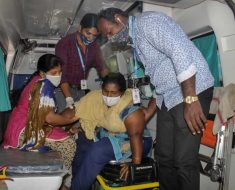
Belly button pain can take many forms. It may come and go, and it could be sharp or dull. Sometimes, it can even radiate to other parts of the body. If you experience this type of pain, there could be a handful of reasons as to why you’re suffering from this odd-sounding symptom. Since belly button pain isn’t a singular condition with only one cause, it could be a symptom of an underlying illness or stomach issue (via Healthline). Often times pain after surgery, gastroenteritis, Crohn’s Disease, or UTIs can also cause belly button pain.
Possible causes of belly button pain: Hernias, constipation, or indigestion

Some people describe their belly button pain as a “sharp, pulling sensation,” where the pain gets worse during a stretch or a cough. If this is the case, you could have a hernia. Feel for a bulge near the belly button, as this is the most common symptom. Hernias are when a part of the intestine or fatty tissue bulges out and creates pain (via Healthline). They typically have to be treated surgically, so it’s best to visit a doctor immediately if you have these symptoms.
Constipation can also contribute to belly button pain. Since getting constipated is a common condition, it’s important to include fiber and fluid in your diet and pay attention to your bowel movements (or lack thereof). Constipation that lasts longer than two months should be brought to the attention of a doctor (via Medical News Today).
Indigestion is commonly felt above the belly button area and can cause pain and discomfort in the vicinity. Avoid fatty fried foods that often bring on indigestion. The National Institutes of Health says that skipping these types of foods entirely, eating more slowly, and chewing food completely can help combat this symptom.
When you should see a doctor for belly button pain
You should visit a medical professional and seek help immediately if your pain is accompanied by more concerning symptoms such as vomiting, bloody stool, or pain that wakes you up at night. This could mean you have an ulcer or inflammatory bowel disease, or even appendicitis (via eMedicineHealth). It’s best to communicate these serious concerns to a doctor instead of trying to deal with it yourself at home.
Most of the time, belly button pain is not a serious matter. However, it’s always safe to take your pain concerns to a professional when necessary, especially if other symptoms crop up. For some people, focusing on your diet can improve this strange (but somewhat common) symptom, but in some cases, it’s best to consult with a doctor to get to the root of the problem.
Source: Read Full Article






